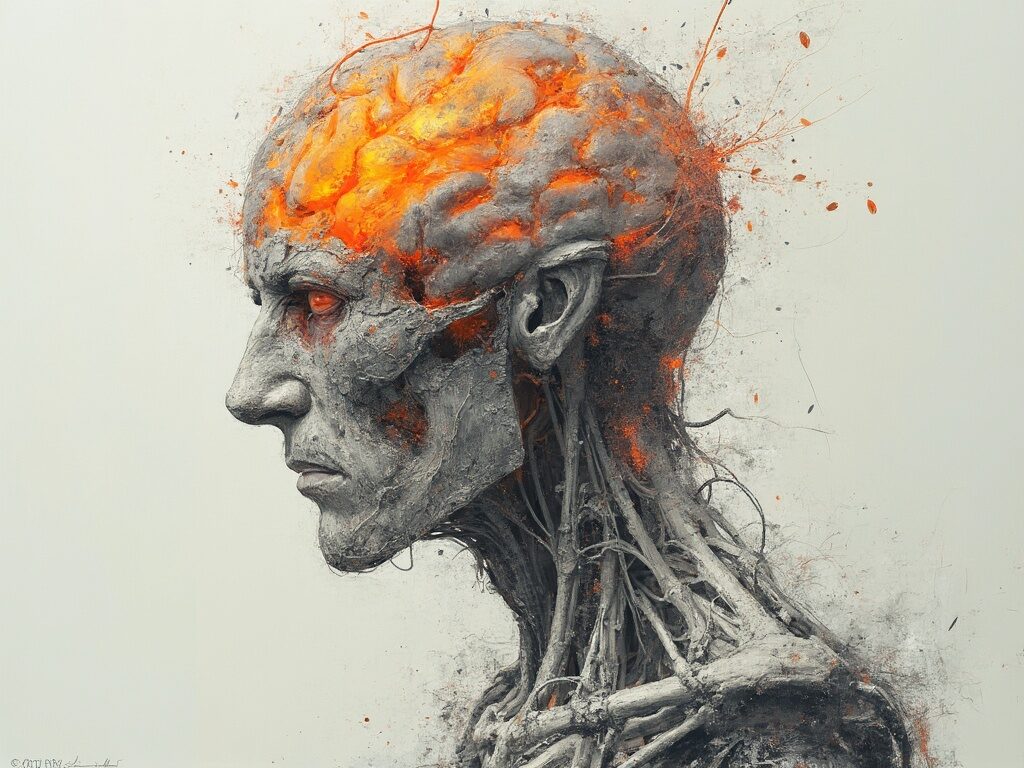
How AI is Revolutionizing Cognitive Health
A New Era in Early Detection
AI is transforming the healthcare industry, especially when it comes to early detection of cognitive decline. Through advanced algorithms and machine learning, AI can now analyze patterns and predict risks faster than ever before.
This ability to process vast amounts of data offers hope for conditions like Alzheimer’s and other dementias, where early intervention can significantly improve quality of life. AI tools are being integrated into existing health systems, making early detection more accessible than ever.
The Science Behind AI Detection
AI relies on machine learning models trained on clinical data, such as brain imaging and cognitive tests. These models identify subtle changes in brain activity that might go unnoticed by traditional methods.
For example, AI-powered systems like those used in MRI scans can flag minute anomalies in neural activity. This precision allows for detection long before symptoms appear. By recognizing these changes, doctors can intervene with treatments earlier, potentially slowing progression.
Bridging the Gap in Accessibility
One major challenge in cognitive healthcare has always been access. Many rural or underserved areas lack specialized clinics. AI tools, however, can bring high-quality diagnostics to remote regions through telemedicine platforms.
Imagine a patient completing an AI-driven test from their home, which is then reviewed by experts hundreds of miles away. This combination of AI and digital health ensures even hard-to-reach communities can benefit.
Key Technologies Driving Change
Voice and Language Analysis
AI can analyze speech patterns for subtle changes that signal early cognitive decline. Words, pauses, and tone are all examined to create a risk profile.
Recent breakthroughs allow mobile apps to perform such tests, making it easier for users to access this technology. Companies like Winterlight Labs have shown promising results, where AI pinpoints verbal irregularities with 90% accuracy.
Brain Imaging Innovations
AI-enhanced imaging tools improve the accuracy of detecting brain-related changes. Technologies such as functional MRI (fMRI) or PET scans paired with AI identify biomarkers of cognitive diseases.
These advancements help doctors spot issues like amyloid plaque buildup, a hallmark of Alzheimer’s, at much earlier stages than conventional methods.
Improving Outcomes with Early Action

Personalized Treatment Plans
AI doesn’t just detect; it predicts outcomes and suggests tailored treatment plans. By analyzing data on a patient’s lifestyle, genetics, and medical history, AI can recommend specific therapies.
This level of customization ensures patients receive targeted interventions, reducing trial-and-error in treatment plans.
Delaying Disease Progression
By catching diseases in their infancy, AI-based solutions empower patients to adopt lifestyle changes or start medications earlier. Studies show early action can delay symptoms, sometimes by years, vastly improving a patient’s quality of life.
Would you like me to expand on this section or introduce a new angle for the next part of the article?
Challenges and Ethical Considerations in AI for Cognitive Health
Balancing Privacy and Innovation
While AI has the potential to revolutionize healthcare, it raises concerns about patient privacy. These systems require vast amounts of data, including sensitive health records and personal details, to function effectively.
Ensuring this data is securely stored and ethically used is critical. Developers must implement strong encryption protocols and transparent policies to maintain public trust.
Furthermore, laws like GDPR and HIPAA are stepping in to regulate data use in healthcare. However, compliance with such frameworks can slow innovation, creating a tricky balancing act between progress and privacy.
Avoiding Bias in AI Models
Bias in AI algorithms is another pressing concern. If training data isn’t diverse enough, the models may not perform equally across different populations. For example, cognitive health symptoms can vary by age, culture, or language, yet many datasets lack adequate representation.
Developers need to ensure that AI tools in healthcare are trained on inclusive datasets to avoid disparities in diagnosis or treatment recommendations.
The Cost Barrier
While AI promises to make healthcare more accessible, the initial costs of implementation can be prohibitive. Small clinics and healthcare providers might struggle to adopt these technologies, creating a gap between large institutions and smaller practices.
Addressing this challenge requires government subsidies, public-private partnerships, and scalable solutions tailored for smaller clinics or developing countries.
Challenges and Ethical Considerations in AI for Cognitive Health

Balancing Privacy and Innovation
While AI has the potential to revolutionize healthcare, it raises concerns about patient privacy. These systems require vast amounts of data, including sensitive health records and personal details, to function effectively.
Ensuring this data is securely stored and ethically used is critical. Developers must implement strong encryption protocols and transparent policies to maintain public trust.
Furthermore, laws like GDPR and HIPAA are stepping in to regulate data use in healthcare. However, compliance with such frameworks can slow innovation, creating a tricky balancing act between progress and privacy.
Avoiding Bias in AI Models
Bias in AI algorithms is another pressing concern. If training data isn’t diverse enough, the models may not perform equally across different populations. For example, cognitive health symptoms can vary by age, culture, or language, yet many datasets lack adequate representation.
Developers need to ensure that AI tools in healthcare are trained on inclusive datasets to avoid disparities in diagnosis or treatment recommendations.
The Cost Barrier
While AI promises to make healthcare more accessible, the initial costs of implementation can be prohibitive. Small clinics and healthcare providers might struggle to adopt these technologies, creating a gap between large institutions and smaller practices.
Addressing this challenge requires government subsidies, public-private partnerships, and scalable solutions tailored for smaller clinics or developing countries.
Real-World Applications of AI in Cognitive Detection
Wearable Technologies for Cognitive Tracking
Wearables like smartwatches and fitness trackers now come with AI-powered health monitoring features. These devices can track metrics like sleep patterns, heart rate variability, and even subtle motor changes—all of which might indicate early cognitive decline.
For instance, devices from companies like Fitbit and Apple use AI algorithms to analyze health trends, alerting users and physicians to potential risks. This continuous monitoring ensures early warnings don’t slip through the cracks.
Digital Cognitive Assessments
AI is making traditional cognitive tests faster and more accurate. Tools like CogniFit or Neurotrack use AI to evaluate memory, attention, and problem-solving skills. These assessments are increasingly gamified, making them engaging and easy to administer.
Such tests can also be repeated frequently, offering longitudinal insights into a patient’s cognitive health over time.
Hospital Systems Enhancing Care
Major hospitals now integrate AI into their diagnostic workflows. For example, Mayo Clinic uses AI to analyze brain scans and improve detection rates for Alzheimer’s and Parkinson’s diseases.
These tools not only enhance accuracy but also reduce the workload on healthcare providers, allowing them to focus more on patient care.
The Role of AI in Preventive Cognitive Care

Predictive Analytics for At-Risk Groups
AI shines in its ability to predict who might be at risk for cognitive decline long before symptoms manifest. For instance, analyzing lifestyle factors, genetics, and environmental exposures helps pinpoint individuals in need of monitoring.
Predictive tools empower patients to take proactive steps, such as dietary changes, exercise, and brain-training activities, to reduce their risk.
Educating the Public with AI Insights
AI can also be a tool for public awareness campaigns. By analyzing large datasets, it can identify trends and create actionable recommendations for populations. These insights can inform public policies aimed at reducing cognitive health risks at the societal level.
Are we ready to explore a concluding section or dive deeper into AI’s role in cognitive healthcare accessibility?
Case Study: How AI Transformed Cognitive Decline Detection in Rural Communities
Background: Bridging the Accessibility Gap
In 2023, researchers at the University of Toronto launched an initiative to test AI’s effectiveness in diagnosing early cognitive decline in underserved regions of Canada. Rural communities often face significant barriers to healthcare, including a lack of specialists and long travel distances.
The goal was simple yet transformative: use AI-powered tools to provide accurate, early detection of dementia-related conditions where traditional healthcare services were scarce.
The AI Solution: Speech Analysis Technology
The research team partnered with Winterlight Labs, a company specializing in AI-based speech analysis for detecting cognitive impairments. Their technology uses natural language processing (NLP) to evaluate speech patterns, tone, and pauses. The system is trained to identify early signs of conditions like Alzheimer’s by analyzing short audio clips of patients speaking.
Participants in rural areas were asked to complete simple speech-based tasks, such as describing a picture or recalling a story. These tasks were recorded via smartphones and uploaded to a cloud-based AI system for analysis.
Implementation: A Community-Centered Approach
- Collaboration with Local Clinics: Local healthcare providers were trained to administer the speech tests and interpret the AI-generated results. This partnership ensured that the initiative was well-received and tailored to the community’s specific needs.
- AI-Assisted Diagnostics: Once uploaded, the AI system processed speech data and generated reports indicating cognitive health risks. These results were then reviewed by neurologists based in urban centers, combining AI precision with human expertise.
- Follow-Up Care: Patients flagged as high-risk were referred for follow-up consultations via telemedicine, eliminating the need for long-distance travel.
Results: Tangible Impacts on Cognitive Health
The study spanned over 12 months and included 1,500 participants. Here are the key outcomes:
- Detection Rates Increased by 40%: AI identified early-stage cognitive decline in patients who would have otherwise gone undiagnosed.
- Reduced Time to Diagnosis: On average, the AI tool reduced the time required for an initial diagnosis by six months.
- Empowered Local Providers: Rural healthcare workers gained access to cutting-edge tools, enhancing their ability to support patients without requiring specialists on-site.

Real-Life Example: Joan’s Story
Joan, a 68-year-old retiree from a small farming town, participated in the program after noticing subtle memory lapses. Her speech test flagged early signs of mild cognitive impairment (MCI).
Thanks to the program, Joan received immediate access to a neurologist via telemedicine. Early intervention, including lifestyle changes and cognitive therapies, significantly slowed the progression of her symptoms.
Lessons Learned and Future Directions
This case study highlights the potential of AI to transform cognitive healthcare, especially in underserved areas. It underscores the importance of combining AI technology with human oversight and local collaboration for maximum impact.
Future plans for the initiative include scaling the program to other remote regions and integrating additional data, such as genetic and lifestyle factors, to enhance diagnostic accuracy.
The Future of AI in Cognitive Health
Continuous Learning for Smarter AI
AI’s potential in cognitive health is just beginning. With each new dataset and patient interaction, these systems become smarter, more nuanced, and better equipped to detect subtle patterns.
Future AI models might incorporate real-time feedback loops, where algorithms learn and adapt continuously as they process new cases. This dynamic evolution ensures tools remain accurate even as new discoveries emerge about cognitive diseases.
Integration with Genomics and Personalized Medicine
The next frontier for AI in cognitive health lies in integrating genetic information. By combining cognitive assessments with genomic data, AI can identify hereditary risks and tailor prevention strategies at a deeper level.
For example, patients with genetic predispositions for Alzheimer’s could benefit from personalized lifestyle plans or medications designed to delay onset, based on their unique risk profile.
Expanding Global Access
As AI becomes more affordable, its reach is expected to extend into underserved regions. Governments and NGOs are already working to deploy AI-powered tools in areas with limited healthcare infrastructure.
From mobile apps to portable imaging devices, these innovations have the potential to bridge global health disparities. No longer will geography dictate access to life-saving cognitive diagnostics.
Ethical AI: The Road Ahead
Building Trust in AI Systems
For widespread adoption, trust in AI must be earned. Transparency in how these systems make decisions is vital. Healthcare providers and developers need to demystify the technology, ensuring patients understand and feel confident in the process.
Additionally, incorporating human oversight in AI-driven diagnostics can create a safety net, combining the precision of machines with the empathy and judgment of human professionals.
Collaborating Across Sectors
The fight against cognitive decline will require collaboration between tech companies, healthcare providers, and policy-makers. Partnerships that foster innovation while addressing accessibility, ethics, and affordability will be key to scaling AI solutions.
AI as a Partner, Not a Replacement
Ultimately, AI will not replace healthcare providers but enhance their capabilities. It acts as a partner, offering tools to catch cognitive decline earlier, recommend personalized interventions, and streamline care.
In a world where early detection means everything, AI stands as a powerful ally—helping us not just live longer, but live better.
FAQs
Are there risks associated with using AI in healthcare?
Like any technology, AI carries risks. Privacy concerns, data security, and algorithmic biases are significant challenges. To mitigate these issues, healthcare providers must adhere to strict data protection laws, like GDPR and HIPAA.
For example, if an AI system is trained on incomplete or biased datasets, it might misdiagnose patients from underrepresented groups. Ensuring diverse training data and human oversight can minimize such risks.
What role does AI play in preventive care for cognitive decline?
AI excels in prevention by identifying high-risk individuals early, often before symptoms appear. For instance, predictive models analyze lifestyle, genetics, and environmental factors to recommend proactive steps.
Imagine someone flagged as at-risk due to genetic markers for Alzheimer’s. AI might suggest brain-healthy diets, regular cognitive exercises, or monitoring sleep quality to reduce the likelihood of disease onset.
How can patients access AI-based cognitive health tools?
Many AI tools are accessible through healthcare providers, wearable devices, and mobile apps. For example, apps like CogniFit offer interactive cognitive assessments, while wearables like Apple Watch monitor health metrics associated with cognitive decline.
Patients can also ask their doctors about AI-enhanced diagnostics, such as brain imaging systems or speech-based evaluations, for more comprehensive care.
Are there any success stories involving AI and cognitive health?
Yes, numerous success stories illustrate AI’s impact. For example, a rural Canadian program used AI to detect cognitive decline via speech analysis. This helped diagnose conditions like mild cognitive impairment early, allowing patients to receive interventions faster.
Another example is Joan, who used an AI-powered app to monitor her memory. Early warnings prompted her to see a specialist, leading to lifestyle changes that delayed her symptoms for years.
Can AI predict who might develop dementia?
Yes, AI can predict dementia risk by analyzing patterns in a person’s genetics, lifestyle, and health data. For instance, tools like DeepMind’s AlphaFold have been adapted to analyze protein structures associated with brain diseases, predicting future risks.
Imagine a scenario where a 55-year-old patient undergoes a cognitive health screening. AI reviews their genetic markers, cholesterol levels, and even sleep habits to assess the likelihood of Alzheimer’s within the next decade.
What types of data does AI use for cognitive health assessments?
AI uses a mix of data, including brain scans (MRI, PET), speech recordings, lifestyle habits, and even typing patterns. For example, neuroimaging data is paired with AI to detect amyloid plaque buildups in the brain, a key indicator of Alzheimer’s.
Speech analysis might evaluate how a person responds to open-ended questions, identifying subtle signs of memory loss or word-finding difficulty. Even wearable devices can contribute data, like tracking motor skills or heart rate fluctuations.
Are there AI tools that patients can use at home?
Absolutely. Several AI-driven apps and devices empower patients to monitor their cognitive health independently. For instance, Lumosity and Elevate offer brain-training games that measure cognitive abilities over time, providing valuable insights.
Some apps, like Neurotrack, let users perform memory and attention tests using a smartphone, generating detailed risk assessments they can share with their doctors.
How does AI ensure its findings are reliable?
AI’s reliability comes from training on massive datasets and continuous validation by medical experts. Developers rigorously test AI models against known outcomes to ensure accuracy.
For example, tools like IBM Watson Health analyze clinical trial data and real-world evidence to validate predictions. Additionally, ongoing feedback loops refine the system, improving its performance with each use.
Can AI detect cognitive decline without invasive tests?
Yes, one of AI’s biggest advantages is its ability to identify decline through non-invasive methods. Speech analysis, for example, only requires a brief conversation, while typing analysis observes patterns as users interact with a keyboard.
A study at MIT demonstrated how AI could predict Alzheimer’s risk by analyzing pauses, speed, and word choice in a person’s speech, all without requiring blood tests or imaging.
How does AI help caregivers manage cognitive health?
AI provides caregivers with tools to monitor and support patients effectively. Wearables can send alerts if a patient shows signs of disorientation, and apps can track medication adherence or schedule reminders.
For instance, a caregiver might use an AI-powered app to monitor changes in a loved one’s daily routine, flagging unusual patterns that could indicate worsening cognitive health.
What industries are investing in AI for cognitive health?
The healthcare, tech, and pharmaceutical industries are leading the charge. Companies like Google Health, IBM, and Biogen are developing tools to enhance diagnostics and treatment options for cognitive conditions.
For example, Biogen has partnered with Apple to research how wearable data can detect early-stage Alzheimer’s. Similarly, startups like Winterlight Labs focus on AI-driven speech analysis to improve early detection.
How quickly can AI detect cognitive decline compared to traditional methods?
AI often detects cognitive decline months or even years before traditional methods. For instance, AI-powered imaging systems can identify early changes in brain activity that might not show up in standard scans.
One study showed that an AI model detected Alzheimer’s-related brain changes up to six years earlier than conventional diagnostics, giving patients more time for intervention.
Can AI help with therapies for cognitive decline?
Yes, AI is increasingly involved in developing and optimizing therapies. Machine learning models are used to personalize treatments, predict responses, and even design cognitive rehabilitation programs.
For example, AI platforms like MindMaze combine virtual reality with cognitive exercises tailored to individual patient needs, enhancing brain function and slowing decline.
Would you like to expand on any of these questions or explore another topic related to AI in healthcare?
Resources
Organizations Leading in AI Research for Cognitive Health
- Alzheimer’s Association: A hub for the latest research on dementia and cognitive health. Their site often highlights AI breakthroughs. Visit Website
- Winterlight Labs: Specializes in AI-driven speech analysis for early detection of cognitive impairments. Visit Website
- Mayo Clinic: Offers extensive information on AI-enhanced diagnostics and therapies for Alzheimer’s and other conditions. Visit Website
Research and Publications
- The Lancet Digital Health: Frequently publishes studies on how AI is shaping early diagnosis in neurology. Explore Journals
- Nature Neuroscience: Covers groundbreaking studies, including AI applications in detecting brain diseases. Read Articles
- arXiv.org: Offers free access to preprints on topics like multimodal imaging and AI in cognitive health. Browse Papers
Apps and Tools for Patients and Caregivers
- Neurotrack: An app offering cognitive health assessments that users can complete at home. Download App
- CogniFit: Provides engaging cognitive training games designed to monitor and improve brain health. Explore App
- Altoida: AI-driven tools for predicting Alzheimer’s progression using augmented reality and mobile data. Learn More
Forums and Communities
- AI in Medicine on Reddit: Join discussions about emerging AI tools in diagnostics and therapy. Visit Subreddit
- LinkedIn Groups – AI in Healthcare: Network with professionals working on AI innovations in cognitive health. Search Groups
- Alzheimer’s Caregiver Forum: Engage with caregivers using AI tools to manage loved ones’ conditions. Join Forum